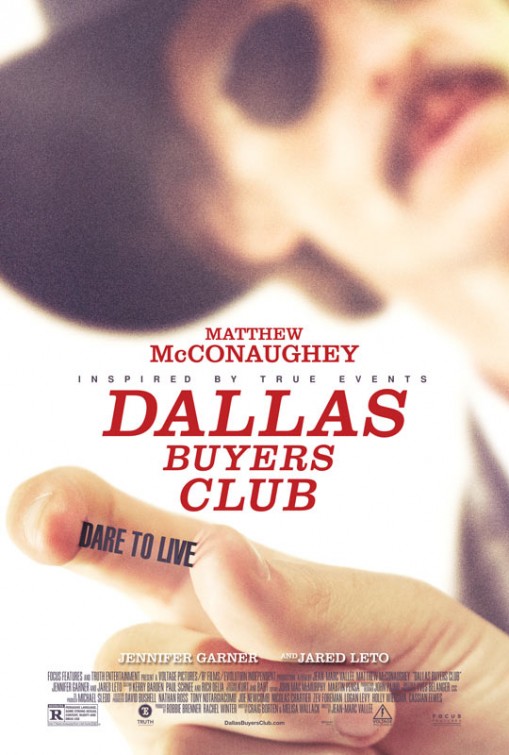Dallas Buyers Club (Jean-Marc Vallée, 2013)
Dallas Buyers Club, the new film by French Canadian director Jean-Marc Vallée (The Young Victoria), is inspired by the true-life story of Ron Woodroof, a hard-partying electrician (and rodeo rider) who, when the film starts (in 1985), is diagnosed with H.I.V. and given 30 days to live. At that time, the only available AIDS medication is AZT (Azidothymidine), and one can only obtain it as part of a year-long clinical trial (for which one has to apply). Unable to wait that long, Woodroof embarks on his own journey for a cure, first bribing a hospital attendant for extra AZT (which almost kills him), and then traveling down to Mexico to find a rogue (read: license revoked) American doctor who prescribes a less lethal cocktail of vitamins and unapproved anti-viral drugs. Feeling better (and not dead), Woodroof returns to the United States and sets up shop – a “buyers club” selling the same mixture that has helped him – in Dallas, to help his fellows AIDS sufferers. 7 years – and many epic battles with the FDA – later, he finally succumbs to the disease, but not before having helped countless others. You can read more about Woodroof on the movie’s website, and you can learn more about the socio-political climate in the 1980s towards AIDS and its sufferers by watching last year’s Oscar-nominated documentary How to Survive a Plague.
Matthew McConaughey plays Woodroof, the latest in a string of roles that has effectively reversed the ever-downward slide towards mediocrity that had – not so long ago – seemed his inevitable fate. Gaunt and ravaged by hard living (and his as-yet-diagnosed condition), McConaughey’s Woodroof is aggressive and unapologetically sex-, alcohol- and drug-obsessed (and very straight). Even when spitting up blood and passing out, he radiates a surging will to live (the tagline and hashtag for the film – see the poster – is “dare to live”). McConaughey lost 50 lbs. for the role, and his clothes hang loose, emphasizing every bony ridge of his weakening body. It is a fully committed performance. We need someone like McConaughey – able to radiate charm in even the worst of circumstances – in this part, in order to understand how Woodroof could create his “buyers club” in broad daylight and convince so many others to join him.
McConaughey does not act in a vacuum, however. He is joined by three others who all give equally of themselves: Jared Leto, Jennifer Garner and Griffin Dunne. Leto – back after five years away from acting (performing with his band Thirty Seconds to Mars) – plays Rayon, a transvestite that the homophobic Woodroof meets in the hospital. Even more than McConaughey, he loses himself in the role. I forgot I was watching a man in drag, and found his transformation astonishing. His is also an incredibly moving portrait of an individual desperately trying to remained dignified in the face of death. He also provides some much needed comic relief. It’s a lot of fun to watch him tease Woodroof who, in spite of his prejudices, has no one else to turn to for help in setting up his business. And, at least in the film, it’s Rayon who truly redeems Woodroof, forcing him to confront his bigotry as the two men develop a friendship through forced proximity.
Garner is also quite fine as one of the doctors who first prescribes AZT, then thinks better of it (the drug’s side effects were often as bas as the disease it was supposed to treat). Her natural perkiness serves her well here since it sets up the eventual heartbreak she will face as her patients die. She has never been better.
But it’s Dunne who surprised me the most, since I’ve never seen him deliver such a finely calibrated performance. He plays the doctor in Mexico, and he’s not in the movie for that long, but he does a lot with small gestures and subtle shrugs that says more about the official approach to AIDS than any one line of dialogue. I was impressed.
If the movie has one flaw, it’s the scenes at the border crossings between Woodroof and the various customs and FDA agents (Woodroof has to buy his drugs abroad). Perhaps because Vallée was worried about his depressing subject matter, he plays them for laughs, allowing McConaughey to cockily hoodwink the officials. But it’s too much, and it almost seems as if everyone is in on the joke. Why, then, do they let the drugs in? Perhaps they are as seduced by the charming performance as we are.
This aside, it’s a moving and well-made film. I highly recommend.


4 Comments